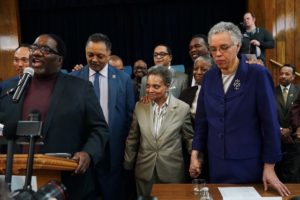White Privilege and Black Power in the Windy City
What’s Happening to Chicago?
Inflation is up. Employment is down. Storefronts are shuttered. Offices are empty. The streets are strewn with debris. And homeless people – drug addicts and the mentally disturbed, primarily – wander about asking for handouts, fighting with one another and intimidating passers-by.
But what is most disturbing is the recent surge in violent crime. By the end of May, there were 1,156 recorded shootings and 252 homicides in Chicago – up 20% and 5% over the same time frame in 2020.
There is also a scary new trend among the young: armed car jackings for joy rides. 632 of them were reported in the first 5 months of this year.
These are alarming facts. The sort of facts that merit media attention. But I’ve seen next to nothing about it in the NYT or on CNN. It’s as if none of this violence matters. Why would that be?
Maybe this could be a factor: The great majority (maybe 90%) of this surge in violence is Black on Black crime.
It’s true. Since George Floyd’s murder, the riots that followed, and, most importantly, the call for defunding the police, Chicago has experienced a tidal wave of violence and murder in its Black neighborhoods. And Chicago isn’t alone. In Baltimore, Memphis, Atlanta, and New York City on the east coast, and in LA, Portland, and San Francisco on the west coast, a surge in violent crime this past year in Black neighborhoods has forced mayors to request emergency funds to put more police on the streets.
Like some others on the left, Chicago’s mayor, Lori Lightfoot, blames her city’s woes on White people. The argument, a layman’s version of Critical Race Theory, goes something like this:
Systemic racism makes it impossible for White people in power to treat Black people in non-racist ways. Even when Whites believe that they are acting in the best interests of Blacks, the actual effect of their decisions is to maintain a culture in America that keeps Black people from achieving success.
The solution is to have more African-Americans at the top of every area of life that matters – in business, in politics, in the media, in education, in entertainment, and in sports.
And the only way to do that is to abandon the inherently racist idea of equal opportunity and replace it with the Critical Race Theory concept of equity: a distribution of benefits according to race. If Blacks represent 13% of the US population, they should represent 14% of the CEOs, 14% of the engineers, 13% of the doctors, and so on.
Using the same reasoning, 13% of Ivy League students (and graduates) should be Black, 13% of law school graduates should be Black, and so on. Blacks should also represent 13% of America’s billionaires, and African-Americans as a group should have the same income level and net worth as Whites.
The most appealing aspect of this theory is that it is simple. Just legislate it. Pass a law that requires equal representation of Black people in every aspect of American life and these systemic problems will gradually disappear.
But here’s the problem with that…
Chicago is already such a city.
* The Mayor is Black.
* The Superintendent of Police is Black.
* The Cook County State’s Attorney is Black.
* The Chief Judge of Cook County Circuit Courts is Black.
* The Illinois Attorney General is Black.
* The Chicago Fire Department Commissioner is Black.
* The Cook County Board President is Black.
* The State Senate Majority Leader is Black.
* The Illinois Lieutenant Governor is Black.
* The Illinois Secretary of State is Black.
* The Clerk of the Circuit Court of Cook County is Black.
* The Cook County Clerk is Black.
* The Chicago Police Board President is Black.
* The Chicago Transit Authority President is Black.
* The CEO of Chicago Public Schools is Black.
* The Commissioner of the Department of Water Management is Black.
* 40% of the City Council belong to the Black Caucus.

No, getting rid of White people in power is not the answer to Chicago’s violence problem. Neither is defunding the police. And by the way, Chicago’s Black denizens already know that. Polls in Chicago and other large cities have shown time and again that the majority of African-Americans want more, not less, police protection.
So, what is the answer?
One possibility: Cities that have implemented what is sometimes called “the broken window” theory of policing saw a dramatic drop in violent crime.
The strategy consists of tougher policing and criminal prosecution for relatively minor crimes like breaking windows, public intoxication, petty larceny, and even vagrancy. By clamping down on the small crimes, the big crimes diminish considerably.
An extreme rendition of this strategy, frisking people that merely look suspicious, was correctly seen by civil rights advocates as unconstitutional harassment. In dismantling such policies, many cities took their agenda farther, instituting an assortment of catch-and-release protocols (such as the suspension of bail) that sent a signal to criminals that they were now in a prosecution-free zone.
Meanwhile, wealthy citizens are fleeing their cities in droves, moving to the suburbs or even to other states where they can work remotely and in peace. As a result, the tax bases of those cities are diminishing drastically… which will lead to the higher taxation of middle-income workers… which will lead to more capital flight.
You won’t hear much about this in the major media because it negates the BLM and Antifa narratives they have been supporting. But the governments of those cities will be very much aware of their diminishing tax base, and they’ll be forced to bring back efforts to establish some level of law and order.
As mentioned above, some are already doing that. The question is: Is it too late?
